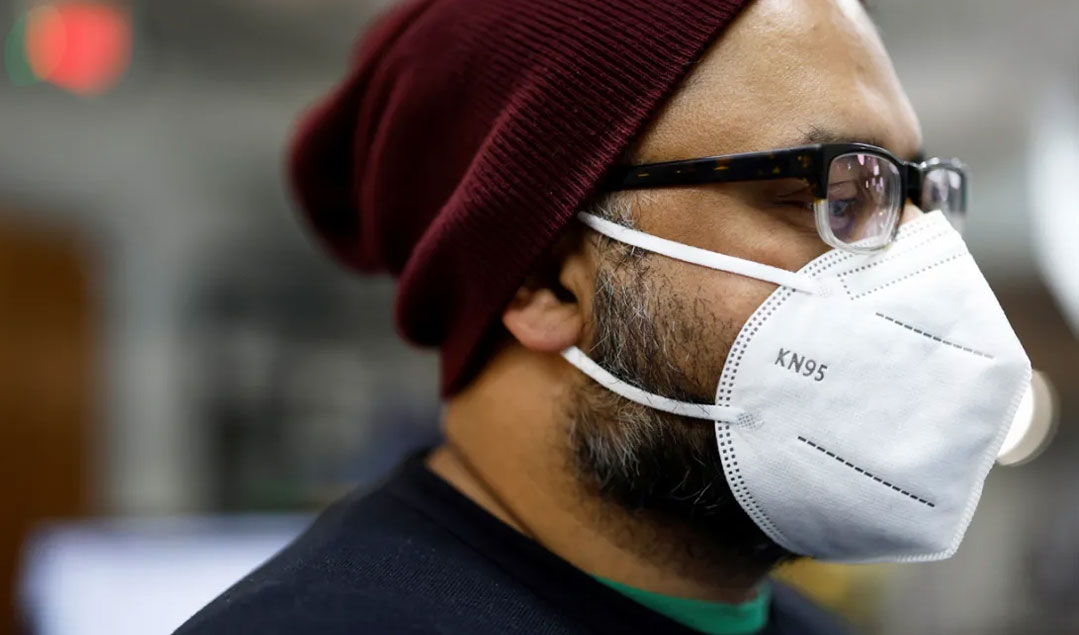
Can face masks help slow the spread of the virus that causes coronavirus disease (COVID-19)?
Yes. Face masks combined with other preventive measures, such as getting vaccinated, frequent hand-washing and physical distancing, can help slow the spread of the virus that causes COVID-19.
Masks have been part of our routine for over two years now, but many people may be confused about wearing respirators like the N95 after the Centres for Disease Control and Prevention (CDC) recently updated its guidance to suggest that N95s are most effective.
As health officials scramble to minimize spread of the highly contagious Omicron variant, many experts have recommended that people switch from cloth or surgical masks to more-protective N95 masks.
After living with COVID-19 for almost two years, many people remain confused about which masks to wear and why. In the earliest days of the pandemic, federal health officials explicitly told members of the public not to wear masks, in a somewhat misguided attempt to preserve supplies for health care workers. Then, in April 2020, the CDC changed its guidance to recommend masks—but specifically asked people to wear cloth face coverings rather than medical masks to reserve inventory for health care workers.
Supply has stabilized since then, yet many people continue to wear either cloth or flimsier surgical masks instead of N95 respirators. Here’s what to know about wearing a mask during the Omicron wave.
What is an N95 respirator?
An N95 respirator is a “respiratory proactive device” that’s designed to fit tightly on your face and form a seal around the nose and mouth to filter out airborne particles. N95s often feature a “cup, flat fold or duckbill shape,” with two straps that secure around the head and a wire-nose bridge that forms to your face, according to the CDC. The respirators are made of a web of polypropylene fibres and some feature a valve to make breathing easier. Because N95 respirators form a tight seal, the CDC notes that they can sometimes be harder to breathe through.
What does an N95 respirator protect you from during the COVID-19 pandemic?
N95 respirators are more effective than cloth and surgical masks because they filter out 95% of large and small particles, including bacteria and viruses, according to Cleveland Clinic. “They protect someone from inhaling particles of SARS-COV-2, the virus that causes COVID-19. “If they fit properly, all airflow should go through the filters rather than leaking around the sides.”
What mask is best for Omicron?
With its high transmissibility, “Omicron has really changed how we need to protect ourselves against getting this. Wearing a good mask is one way to do that, along with best practices like vaccination, social distancing and ensuring good ventilation.
A recent study published in the journal Proceedings of the National Academy of Sciences estimated that the risk of COVID-19 transmission can be reduced up to 75-fold when a sick person and someone nearby both wear N95-style masks as opposed to surgical masks. And a research review published in 2021 found that N95s halved health care workers’ risks of getting COVID-19, relative to surgical masks.
How to Wear the N95 Mask?
Always read and follow the manufacturer’s directions when using an N95 mask. It must cover both the nose and mouth to keep you from breathing in mold and dust. If it does not have a snug fit, it will not work properly. Correct fit of the mask requires contact with smooth skin. It will not work properly for people with beards or facial hair. Even one-day beard growth has been shown to let air leak in. Always use both straps on the mask to hold it in place to keep air from leaking around it.
Can I reuse an N95?
N95 masks are supposed to be worn once. If you must re-wear a mask, you can leave it in a brown paper bag in a room-temperature, dry environment for a few days; by then, all the germs on it should have died, according to guidance from experts at the University of California, Riverside. But if your mask is visibly soiled or loses its snug fit, you need to pitch it.
N95 respirators intended for medical settings have different certifications than those used in general industry, but Health Canada advises that those certified for industry can be used if medical grade versions are not available.
What makes an N95 different from other face masks?
N95 masks are so called because they are a U.S. standard that requires masks to be able to filter out at least 95% of very small particles, including droplets containing the coronavirus. They are typically worn by medical workers as well as employees at factories working with paint or industrial chemicals, for instance.
Surgical masks and simpler cloth masks, by comparison, are largely intended to prevent the wearer from spreading germs and are simpler to put on and wear. Surgical masks don’t create as tight a seal to the face as N95 masks.


2 Comment(s)
The answer is yes. Studies have shown that wearing a face mask can reduce your risk of becoming infected with the virus, as well as reducing your chances of transmitting it to others. Face masks can also help protect those around you by trapping droplets from coughing and sneezing, which can contain infectious particles.
Yes, face masks can help slow the spread of the virus that causes COVID-19. The virus spreads mainly through respiratory droplets when an infected person talks, coughs, or sneezes. Face masks can block these droplets from reaching other people, reducing the risk of transmission.
Leave a Comment